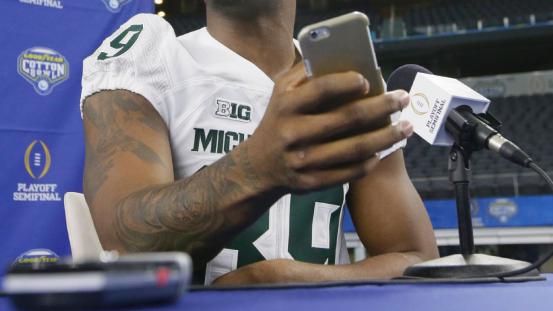- Commissioner’s statement on Ventura, Marte
- Ronnie O’Sullivan: Masters champion ‘felt so vulnerable’ in final
- Arron Fletcher Wins 2017 WSOP International Circuit Marrakech Main Event ($140,224)
- Smith challenges Warner to go big in India
- Moncada No. 1 on MLB Pipeline’s Top 10 2B Prospects list
- Braves land 2 on MLB Pipeline’s Top 10 2B Prospects list
- Kingery makes MLB Pipeline’s Top 10 2B Prospects list
- New Zealand wrap up 2-0 after Bangladesh implosion
- Mathews, Pradeep, Gunathilaka to return to Sri Lanka
- Elliott hopes for rain for Poli
Early on, recruits are happy with text message deregulation
- Updated: May 26, 2016

9:33 AM ET
The NCAA announced two rule changes this past April, and both were met with plenty of vitriol. The one that resounded the most in the immediate aftermath was the decision to ban satellite camps, which was hit with such backlash that it was soon overturned and satellite camps were reinstated.
The second big decision from the NCAA came in the form of deregulating text messages. It allows coaches and recruiting personnel the ability to text any prospect any number of times.
“The texting thing is the most ignorant thing I’ve ever heard in my life,” Ohio State coach Urban Meyer said at the time.
A number of coaches believed that this would result in a free-for-all when it came to any staff reaching out to any recruit at any time. Coaches were concerned that recruits wouldn’t have the same ability to virtually walk away from a conversation via text the same way they can with Twitter or any other social networking site — by not opening the app.
“The texting thing, I was against,” said Cal head coach Sonny Dykes, who offered his take on why texting is different than communicating via social media. “The big important difference is somebody has to friend you in order to be able to talk to them via social media. If you were a kid and we were recruiting you and you weren’t interested, you weren’t getting 250 text messages a day from us, because you weren’t getting anything from us. That inability to maintain some privacy I think is a very substantial negative.”
Following the rule change, it was apparent that many coaches didn’t trust their counterparts to keep their text message numbers within …
continue reading in source espn.go.com
